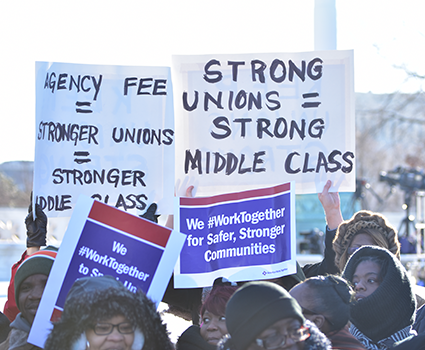Amicus Briefs argue Supreme Court should rule for AFSCME in Janus case

Over 35 amicus briefs have been filed with the U.S. Supreme Court in opposition to the lawsuit initiated by Illinois Gov. Bruce Rauner that aims to take away the freedom of working people to join together in strong unions to speak up for themselves and their communities.
Amicus briefs are legal documents filed by non-litigants with a strong interest in a court case’s subject matter. The briefs advise the court of relevant, additional information or arguments that the court might wish to consider.
Collectively, the authors of the AFSCME amicus briefs supporting AFSCME’s position in the case of Janus v AFSCME Council 31 argue for upholding Abood v. Detroit Board of Education (1977), a case in which the Supreme Court unanimously agreed that Fair Share fees for public employees are permissible under the First Amendment.
The amicus briefs filed on behalf of AFSCME and working people come from a wide-ranging set of supporters, including conservative First Amendment originalists, Nobel prize-winning economists, state and local public employers from Illinois and across the country, Republican lawmakers, child protective service workers, more than 85 civil rights groups including the Human Rights Campaign, ecumenical communities and the U.S. Conference of Catholic Bishops, mayors of major U.S. cities, as well as U.S. senators who examine the political intent behind this case. You can also read the Amicus Briefs at SCOTUSblog (scroll to bottom) and AFSCME’s opening brief.
The U.S. Conference of Catholic Bishops particularly note their longstanding opposition to “right-to-work” legislation and point to various papal statements and encyclicals in support of labor rights dating back to 1891 and as recent as Pope Francis’s June 2017 address. He told delegates from the Confederation of Trade Unions in Italy: “There is no good society without a good union, and there is no good union that is not reborn every day in the peripheries, that does not transform the discarded stones of the economy into its cornerstones.”
Compare this broad array of supporters to the briefs filed by the other side in this case, which are mostly authored by political interest groups funded by a small band of right-wing interests. It is apparent that Janus v. AFSCME Council 31 is a political attack on the freedoms of working people by the same billionaires and corporate interests that have for years rigged our economy and politics in their own favor. The fact that workers have a voice on the job with their unions is something that galls the ultra-rich. Because when workers join together they can improve their wages and benefits—and influence the decisions that affect their lives.
At a time when America desperately needs to regain its faith in our government institutions, we hope the Supreme Court will see this ruse for what it is and decide the case on the merits.
Oral arguments for Janus v. AFSCME Council 31 are scheduled for February 26.